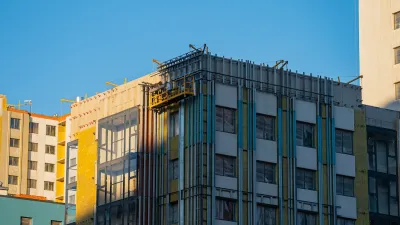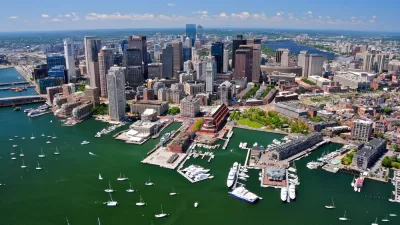The American Institute of Architects gave a reality check regarding its ambitious and aggressive carbon reductions targets.

"According to the 'AIA 2030 Commitment 2015 Progress Report,' [pdf] released today, the design industry is not on pace to meeting the ambitious goal of having every project designed by a signatory firm achieving carbon neutrality by 2030," according to an article by Wanda Lau.
In a separate post, Kim Slowey puts the findings of the progress report succinctly: "Only 4% of projects so far have met the 70% energy savings target for 2015 building performance, with the average savings coming in at 38%."
Although the building industry is falling short of the goals set forth in the 2030 Commitment, "All told, the energy predicted to be saved from the 2015 reported projects totals 21 million metric tons of greenhouse gas emissions," explains Lau. "According to the U.S. Environmental Protection Agency’s Greenhouse Gas Equivalencies Calculator, this is the equivalent of powering 2.2 million houses in a year." Participation and the total square footage of projects in the initiative have also increased since 2014.
As part of the article's in-depth coverage of the AIA's progress report, Lau includes an examination of the energy modeling that the report emphasizes for projects to meet "increasingly stringent benchmarks."
FULL STORY: A Reality Check from the AIA 2030 Commitment 2015 Progress Report

Montreal Mall to Become 6,000 Housing Units
Place Versailles will be transformed into a mixed-use complex over the next 25 years.

Planetizen Federal Action Tracker
A weekly monitor of how Trump’s orders and actions are impacting planners and planning in America.

DARTSpace Platform Streamlines Dallas TOD Application Process
The Dallas transit agency hopes a shorter permitting timeline will boost transit-oriented development around rail stations.

Without International Immigrants, the Rural US Population Would Be Falling 58%
Census data shows that population growth in rural areas is due in large part to international migrants.

Dead End: Nine Highways Ready for Retirement
The Freeways Without Futures report describes the nation’s most promising highway removal proposals.

Congressman Proposes Bill to Rename DC Metro “Trump Train”
The Make Autorail Great Again Act would withhold federal funding to the system until the Washington Metropolitan Area Transit Authority (WMATA), rebrands as the Washington Metropolitan Authority for Greater Access (WMAGA).
Urban Design for Planners 1: Software Tools
This six-course series explores essential urban design concepts using open source software and equips planners with the tools they need to participate fully in the urban design process.
Planning for Universal Design
Learn the tools for implementing Universal Design in planning regulations.
City of Mt Shasta
City of Camden Redevelopment Agency
City of Astoria
Transportation Research & Education Center (TREC) at Portland State University
City of Camden Redevelopment Agency
Municipality of Princeton (NJ)
Regional Transportation Commission of Southern Nevada





























